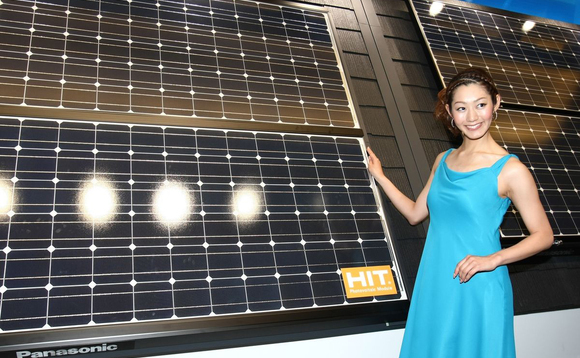
Japan renewables: Policy play

Japan’s response to the Fukushima nuclear crisis has been to draw up plans for the world’s biggest alternative energy market. Foreign investors see solar power as the surest route to sustainable returns
While investment in alternative energy dropped 14% globally last year, Japan bucked the trend in sensational style. Capital committed to the space jumped 80% to $35.4 billion in 2013.
The increase is a product of necessity as the country struggles to fill the gap left by its shuttered nuclear plants in the wake of Fukushima crisis in 2011. And the under-penetrated solar market is regarded by foreign private equity and infrastructure investors as rich in potential. Money is expected to flow into existing and greenfield projects.
Goldman Sachs plans to pump JPY50 billion ($487 million) into the sector over the next five years; UBS and GE Capital are targeting domestic operators; and Macquarie Capital announced a joint venture with local engineering firm Maeda Corp. to focus infrastructure and renewable energy projects, although progress has yet to be made. A consortium led by Equis Funds Group and Partners Group, meanwhile, is building a brand new utility business in Japan.
There is also considerable interest from domestic players, with PE funds, financial institutions, energy trading houses and conglomerates keen to provide project financing.
"It is an attractive market because the government is committed to rapidly building up the renewable energy sector and they have a well thought-through subsidy regime," says Benjamin Haan, Partners Group's head of private infrastructure in Asia Pacific. "The opportunity is huge as the development of the sector is just at its early stage. We do think that this is one of the most attractive opportunities we see globally right now."
The question for foreign investors is how comfortable are they hitching themselves to this government-led renewables transformation. Where does the hype stop and reality begin?
Ambitious targets
Renewable energy currently accounts for less than 10% of Japan's total energy mix. The government wants this share to rise to at least 20% by 2030. Solar is expected to play a significant role in this expansion, with capacity reaching 28 gigawatts by 2020 and 53 GW by 2030. Come 2050 it is supposed to meet 10% of total domestic energy needs.
With this in mind, the Ministry of Economy, Trade & Industry (METI) announced a feed-in tariff scheme for renewables in 2012. The solar feed-in tariff was set at JPY42 per kilowatt (KW), the highest in the world at that time.
"Last year Japan was number one globally in terms of investment in solar energy. It's not just hype and it's not going away in the near term," says Paul Ford, a transaction services partner at KPMG FAS. "When you look at the size of Japan's energy market and the long term need to both replace nuclear power and reduce liquefied natural gas imports, clearly there is a real opportunity in terms of size and growth of the renewable energy market."
There is one notable difference between solar and other forms of renewable energy, such as wind or biomass: it is generally less speculative, with a shorter implementation period and more predictable returns.
The high feed-in tariff attracted a deluge of project applications before it was quickly reduced to JPY36 per KW and then JPY32 per KW. Industry participants compare this policy-driven speculation to past activity in the real estate market.
As one local GP explains, developers require approval from the government to produce solar energy at a specific site, but few want to get their hands dirty producing electricity. The preference is to sell the land rights at a higher price to other investors.
"In other cases, solar energy providers won't start construction once they receive the land permit until the price of solar panels has dropped to a point at which they can save on production costs," the GP adds.
In this context, it has become difficult finding suitable sites for solar facilities. Developers are only allowed to use "unproductive land," such as young forests, golf courses or even industrial zones. Another consideration is that the location of the site has to be convenient for connecting to transmission cable and getting electricity online.
The government has introduced a raft of criteria that projects must meet within a certain timeframe as part of efforts to weed out speculators. For example, for projects that were previously approved at JPY42 per KW, applicants should demonstrate before August this year that they have taken steps towards implementation. Foreign investors are generally reassured by such moves, seeing them as evidence of the government's commitment to the sector.
Two-and-a-half years ago, Singapore-based Equis hired a local team to navigate the Japanese market and this resulted in creation of utility start-up Nippon Renewable Energy (NRE).
"They can interface and build relationships with key counterparties in Japan. It's very important to have local employees managing the business, in particular now that Japan is more open to solar energy. We feel that not having that local expertise is going to be a key barrier to entry for any new participants trying to enter the Japanese renewable energy market," says David Russell, CEO and partner of Equis.
Rather than enter into agreements with third parties, the Equis team focused on land acquisitions from its own balance sheet. The rationale was, if they controlled the land directly they would also have complete autonomy over development and construction, unrestrained by the will of speculators.
"Of course, this approach carries a little more risk compared to what we've done in developed nations because we have to put the cash up front to secure the project. However, it's tempered by the fact that we have confidence in the Japanese government to deliver on its renewable energy plans," says Adam Ballin, a partner at NRE.
Once land has been acquired, a developer enters the engineering, procurement and construction (EPC) phase. Here a local partner is necessary to serve as contractor on the project and offer assistance in obtaining the relevant permits and managing local stakeholders.
The newly-established NRE received a $250 million equity investment earlier this year led by Equis and Partners Group. Co-investors include Babson Capital, LGsuper and Qantas Superannuation. NRE has 300 MW in its development pipeline for the next two years, and the first 48 MW is being constructed using the investors' equity. Discussions are underway with Japanese banks for debt financing for the rest.
While foreign PE investors are increasingly positive on Japan's solar prospects, some of their domestic counterparts are less bullish. Tokio Marine Asset Management has raised JPY 22.5 billion across two solar-focused funds in the last two years. For its next fund, the firm plans to diversify into other sources of renewable energy, such as biomass, geothermal and hydro.
"Electric power companies' capacity to accept volatile sources of power like solar and wind is an obstacle in developing the market. Both are subject to natural conditions, which undermine the stability of electric system itself. We have already see cases in which power companies have denied requests for connection," says Koji Sumii, head of product planning at Tokio Marine.
Proliferation of choice
However, the government could head off concerns in this area as well. Last week, a bill was passed outlining plans to deregulate the electricity retail market over the next two years, which is expected to give another boost to the alternatives.
Under the new regulations, end-users will be allowed to pick the companies that provide their electricity. At present they are restricted to regional utility providers companies, which are controlled fewer than 10 service providers. Utility conglomerates will also be required to spin off their generation, transmission and distribution businesses into separate entities by 2020 to create more competition.
"Deregulation in the electricity retail sector has already raised interest from companies to enter the electricity business and approach end-users. This is a whole new business opportunity, which has already prompted investments, including private equity investments, into the energy sector," says Motoya Kitamura, partner at ROC Partners, a fund-of-funds which recently spun-out from Macquarie Group.
Deregulation also opens up new potential areas of investment for private equity. For example, taking a minority position in a start-up electricity service provider - which previously wouldn't have been able to survive in the highly concentrated market - should be an option. It can target consumers who may be looking for renewable energy at a cheaper price.
Hann of Partners Group sees it as part of the broader maturation of the industry.
"It takes the introduction of a new feed-in tariff or other support measures to kick-start the development of solar in a new market," he says. "The first movers tend to be experienced specialist foreign players or larger local industrial players. As the sector matures over time, other players become more comfortable with investing in the sector, such as local pension funds.
Latest News
Asian GPs slow implementation of ESG policies - survey
Asia-based private equity firms are assigning more dedicated resources to environment, social, and governance (ESG) programmes, but policy changes have slowed in the past 12 months, in part due to concerns raised internally and by LPs, according to a...
Singapore fintech start-up LXA gets $10m seed round
New Enterprise Associates (NEA) has led a USD 10m seed round for Singapore’s LXA, a financial technology start-up launched by a former Asia senior executive at The Blackstone Group.
India's InCred announces $60m round, claims unicorn status
Indian non-bank lender InCred Financial Services said it has received INR 5bn (USD 60m) at a valuation of at least USD 1bn from unnamed investors including “a global private equity fund.”
Insight leads $50m round for Australia's Roller
Insight Partners has led a USD 50m round for Australia’s Roller, a venue management software provider specializing in family fun parks.






